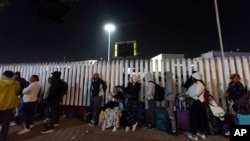The Trump administration is putting on hold some immigration requests from migrants paroled into the United States under specific programs.
This means U.S. Citizenship and Immigration Services has halted processing applications from those seeking to adjust their immigration status to a more permanent one. The pause affects those who entered the U.S. through parole programs, including Uniting for Ukraine (U4U); Cubans, Haitians, Nicaraguans and Venezuelans (CHNV); and family reunification parole (FRP).
A U.S. official told VOA via email that the reason for the suspension was a security review.
"This is pending the completion of additional vetting to identify any fraud, public safety or national security concerns," the U.S. Department of Homeland Security official told VOA on background — a method often used by U.S. officials to share information with reporters without being identified.
These humanitarian parole programs were launched under the Biden administration as part of an effort to curb irregular migration by providing legal pathways for certain groups. The executive branch was granted parole authority by Congress in 1952, allowing the president to admit individuals on a case-by-case basis for urgent humanitarian reasons.
About 530,000 people from Cuba, Haiti, Nicaragua and Venezuela were allowed to enter the U.S. under CHNV. Additionally, about 350,000 Americans sponsored nearly 240,000 Ukrainians through the U4U program, according to CBS News.
Beneficiaries of any humanitarian parole program had to meet all the requirements of each program. These included establishing U.S.-based financial sponsors, undergoing security vetting and completing vaccine demands. They also had to pay their own travel expenses if they received travel authorization from the U.S. government.
The humanitarian parole authority allowed the approved applicants to live and work legally in the U.S. temporarily, but it did not lead to permanent residence.
The Trump administration is now calling for additional vetting to safeguard national security and ensure the integrity of the immigration system, according to the DHS official.
The Trump administration has not provided details of what specifically triggered the review or how long it might last.
No removals
Kathleen Bush-Joseph, a policy analyst with the Migration Policy Institute, said on X that despite this suspension, people "cannot be deported without a removal order."
The pause does not change Cubans' eligibility for the Cuban Adjustment Act, which allows them to apply for permanent residence after one year in the U.S.
Haitians may still qualify for Temporary Protected Status, which provides work authorization and relief from deportation. Along with Nicaraguans, they also have the option to apply for asylum, though they must demonstrate a credible fear of persecution based on race, religion, nationality, social group or political opinion.
Venezuelans in the country can still apply for asylum. But the Trump administration ended the TPS designation granted in 2023 to hundreds of thousands of Venezuelans, setting it to expire on April 7, 2025.
Those choosing to seek asylum must demonstrate a credible fear of persecution in their home countries based on race, religion, nationality, membership in a particular social group or political opinion.
The family reunification parole program, initially created for Haitians and Cubans, expanded in August 2023 to include individuals from Colombia, El Salvador, Guatemala and Honduras. The program allows people approved for family-based visas to enter and remain in the U.S. temporarily while awaiting their green cards.
Immigration advocates warn that suspending these programs could lead to prolonged uncertainty.
Iryna Mazur, an honorary consul of Ukraine in Philadelphia and an immigration lawyer, told VOA that despite the pause, established immigration laws remain in place.
"What it means is that, probably, as of today, we would expect significant delays in processing all of the applications," she said.
What's next?
The administration has not indicated when processing might resume.
It is unclear whether applicants will need to reapply or their pending cases will eventually be processed as normal. The administration’s move is expected to face legal challenges and pushback from immigrant-rights groups as communities await clarity.
"I'm absolutely convinced that the legal community, legal immigration community of the United States, will respond properly," Mazur added.
Iryna Shynkarenko of VOA's Ukrainian Service and Salome Ramirez Vargas of VOA's Spanish Service contributed to this report.






